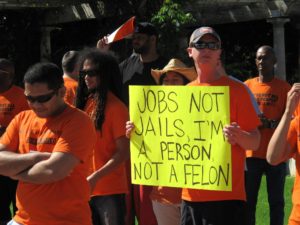Thoughts on Fair Chance Hiring for formerly incarcerated individuals
By Ashley Bean Thornton
 For several years now I have been a part of a conversation in Waco about how to help people returning to our community after incarceration to “reintegrate” into society. (Please visit the McLennan County Reintegration Roundtable website for more information about this on-going work.) One of the key elements for successful reintegration is employment. As you can imagine it is very difficult for an ex-offender to get a job interview much less a job. One idea that is being discussed to help formerly incarcerated individuals get work is “Fair Chance Hiring.” Fair Chance Hiring policies remove the questions about criminal history information from a job application. This change allows employers to judge applicants on their qualifications first, without the stigma of a criminal record. Questions about criminal history are moved later in the process. The idea is that if an employer has had a chance to examine the qualifications of the applicant, and possibly meet the applicant, that employer would be more likely to give the applicant a chance at a job. According to a flyer I received recently from Mission Waco representatives, 13 states have embraced this policy and around 70 cities and counties. On Saturday, April 25, 2015, several organizations in Waco including Mission Waco, Mission World and students from the Tarleton State University Social Work program worked together to hold a rally to advocate for Fair Chance Hiring. I was one of the speakers at the rally. Here are the thoughts I tried to share. Thank you for considering this important idea. – ABT
For several years now I have been a part of a conversation in Waco about how to help people returning to our community after incarceration to “reintegrate” into society. (Please visit the McLennan County Reintegration Roundtable website for more information about this on-going work.) One of the key elements for successful reintegration is employment. As you can imagine it is very difficult for an ex-offender to get a job interview much less a job. One idea that is being discussed to help formerly incarcerated individuals get work is “Fair Chance Hiring.” Fair Chance Hiring policies remove the questions about criminal history information from a job application. This change allows employers to judge applicants on their qualifications first, without the stigma of a criminal record. Questions about criminal history are moved later in the process. The idea is that if an employer has had a chance to examine the qualifications of the applicant, and possibly meet the applicant, that employer would be more likely to give the applicant a chance at a job. According to a flyer I received recently from Mission Waco representatives, 13 states have embraced this policy and around 70 cities and counties. On Saturday, April 25, 2015, several organizations in Waco including Mission Waco, Mission World and students from the Tarleton State University Social Work program worked together to hold a rally to advocate for Fair Chance Hiring. I was one of the speakers at the rally. Here are the thoughts I tried to share. Thank you for considering this important idea. – ABT
My written remarks for the Fair Chance Hiring Rally (They don’t exactly match what I ended up saying, but pretty close!) :
One of the most challenging things about living together in a community is balancing the needs and wants of various groups within the community while also keeping in mind what’s good for the whole community. When we find a tool that can help us do this, we need to consider it seriously. I think this fair chance hiring notion is just such a tool, and I support it. I want to speak for just a moment about how I came to that conclusion. I want to talk for just a little bit about how the practice of asking about criminal history a little later in the hiring process can balance the needs of formerly incarcerated job seekers with the needs of employers who are hiring – and how it can benefit our whole community.
 I’ll start with what I believe is good for the whole community. I believe it is good for the whole community for as many of us who can work, to be working. When more of us are working and earning a good income, it benefits the economy of our whole community – more people are buying things and making investments in their homes and more people are paying the taxes that pay for our community amenities. On the other hand, when some people cannot get work because of whatever barrier, whether it be lack of transportation or child care or education, or – as in the example we are grappling with today — a personal history that includes incarceration – it is bad for all of us. It hurts our economy and reduces the pool of resources available to our community. It does not do us any good as a community to have a whole group of people who find it difficult, if not almost impossible, to find work. When more people in our community are working, we are all better off. I believe moving questions about criminal history a little later in the hiring process will result in more people finding work, and I think that will be better for all of us.
I’ll start with what I believe is good for the whole community. I believe it is good for the whole community for as many of us who can work, to be working. When more of us are working and earning a good income, it benefits the economy of our whole community – more people are buying things and making investments in their homes and more people are paying the taxes that pay for our community amenities. On the other hand, when some people cannot get work because of whatever barrier, whether it be lack of transportation or child care or education, or – as in the example we are grappling with today — a personal history that includes incarceration – it is bad for all of us. It hurts our economy and reduces the pool of resources available to our community. It does not do us any good as a community to have a whole group of people who find it difficult, if not almost impossible, to find work. When more people in our community are working, we are all better off. I believe moving questions about criminal history a little later in the hiring process will result in more people finding work, and I think that will be better for all of us.
Next I would like to talk about the group of people who make up this population of formerly incarcerated individuals. Certainly no one doubts it is a benefit to them to be able to find work. We all need money to live. The best way to get money is to have a legal job. If that pathway is closed to you, then what options do you have? You can depend on your family – whose resources more often than not are already stretched to the breaking point. You can start your own business if you have the resources and personality to do that. Or, really, what else can you do? Add this financial reality to the psychological stress of being rejected for work at every turn, and you can see we have an environment that makes it very difficult for a person returning from incarceration to successfully reintegrate into our community. Moving questions about criminal history to a little later in the hiring process at least gives formerly incarcerated people a fighting chance to make their case, to put their best foot forward, to explain why what they CAN do is worth considering. It doesn’t give them a guarantee of a job – none of us have that – but it at least gives them a chance, a foot in the door, to finding a job that will allow them to contribute to our economy.
Finally, I would like to talk about this from the point of view of an employer. I have been an employer. I have had the job of trying to hire the best person for a job as quickly as possible. I know first-hand the expense and aggravation of making a bad hire. And I will admit that as an employer I first thought that getting rid of “the box” – the little check box on the application where a person indicates that they have made some mistakes in their past – was a bad idea.
My resistance was based on a desire for efficiency – when I am in hiring mode I don’t want to waste my time. I want to weed out bad candidates and focus only on good candidates. That little box seemed like an easy way to eliminate unsuitable job seekers. What I have learned is that, like with most things, the easy way is not always the best way.
 First of all, just because a person doesn’t check the box, that doesn’t mean they are going to be a stellar employee. There are plenty of people out there in the job market who have all kinds of problems that impinge on their ability to be good employees – drinking problems, drug problems, all kinds of problems – just because someone’s problems haven’t resulted in a conviction doesn’t mean they are a perfect angel. Just because a person doesn’t check the box doesn’t mean they have never done anything wrong. The absence or presence of a checkmark in that box doesn’t tell me this person will be a good employee and that person won’t. When it gets right down to it, hiring is somewhat a game of chance. That little checkmark really doesn’t give you as much useful information as it seems like it might at first glance.
First of all, just because a person doesn’t check the box, that doesn’t mean they are going to be a stellar employee. There are plenty of people out there in the job market who have all kinds of problems that impinge on their ability to be good employees – drinking problems, drug problems, all kinds of problems – just because someone’s problems haven’t resulted in a conviction doesn’t mean they are a perfect angel. Just because a person doesn’t check the box doesn’t mean they have never done anything wrong. The absence or presence of a checkmark in that box doesn’t tell me this person will be a good employee and that person won’t. When it gets right down to it, hiring is somewhat a game of chance. That little checkmark really doesn’t give you as much useful information as it seems like it might at first glance.
Second, I have learned through listening to employers who make it a practice to give formerly incarcerated individuals a chance that giving someone a chance can be a good step toward developing a loyal, hard-working, long term employee. Make no mistake – when I am hiring, it is not my goal to be a charity institution. It is my goal to get the best employee for the job. If I can get myself a good, loyal, hardworking, long term employee by giving a motivated person with good skills a chance, why wouldn’t I want to do that? That’s good for me and good for my organization.
I would not support a policy of not being able to ask about criminal back ground at all – certainly as a hirer I would want to know about past behavior. Some crimes will certainly disqualify some people from some jobs. But, if I weed people out because they checked a box before I ever met them, then I am missing out on some potentially good employees. If I talk to someone, find out about their skills, get a sense of their motivation and work ethic, and then find out about the mistakes of their past and what they learned from those mistakes – I can make an informed decision.
I have come to believe that fair chance hiring practices are potentially a benefit to employers as well. Yes, it may take more time in the hiring process – moving the question about past mistakes until later in the process, giving people a chance to make their case, takes more time than throwing away an application that has a check mark in the wrong place. But, finding a great employee is a beautiful thing. If time spent in the hiring process results in a great employee – regardless, or maybe even because of, the mistakes in their past – it saves time in the long run. We have employers in Waco who are reaping this benefit right now because they are willing to give people a chance. I believe it would be a benefit to the employers, to the formerly incarcerated individuals and to our whole community if more would do so.
 This Act Locally Waco blog post is by Ashley Bean Thornton, the Manager of the www.www.actlocallywaco.org website and the editor of the Friday Update newsletter. The Act Locally Waco blog publishes posts with a connection to these aspirations for Waco. If you are interested in writing for the Act Locally Waco Blog, please email ashleyt@actlocallywaco.org for more information.
This Act Locally Waco blog post is by Ashley Bean Thornton, the Manager of the www.www.actlocallywaco.org website and the editor of the Friday Update newsletter. The Act Locally Waco blog publishes posts with a connection to these aspirations for Waco. If you are interested in writing for the Act Locally Waco Blog, please email ashleyt@actlocallywaco.org for more information.
